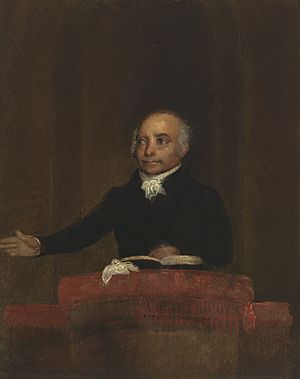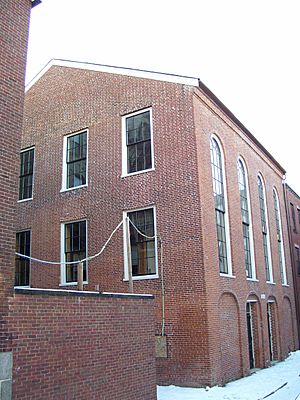Thomas Paul (minister) facts for kids
Quick facts for kids
Reverend
Thomas Paul
|
|
|---|---|

Portrait of Thomas Paul, by Thomas Badger, ca.1825
|
|
| Born |
Thomas Paul
3 September 1773 Rockingham, New Hampshire, United States
|
| Died | 13 April 1831 (aged 57) Boston, Massachusetts, United States
|
| Nationality | American |
| Education | Free Will Baptist church |
| Occupation | Pastor |
| Spouse(s) | Catherine Waterhouse |
| Children | Ann Catherine Paul
Susan Paul (1809) Thomas Paul Jr. |
Thomas Paul (1773–1831) was an important Baptist minister. He lived in Boston, Massachusetts. He became the first pastor of the First African Baptist Church. Today, this church is known as the African Meeting House. Thomas Paul was an abolitionist, meaning he worked to end slavery. He was a key leader in the black community. He also worked as a missionary in Haiti.
Contents
Early Life and Education
Thomas Paul was born in Exeter, New Hampshire. His birthday was September 3, 1773. He went to the Free Will Society Academy with two of his brothers. Later, he studied to become a minister. He attended the Free Will Baptist Church in Hollis, New Hampshire.
Paul was baptized by Reverend S.F. Locke. He became an ordained minister in 1804. On December 5, 1805, he married Catherine Waterhouse. She was from Cambridge, Massachusetts. Soon after, they had three children. The family then moved to Boston.
Founding the First African Baptist Church

When Thomas Paul moved to Boston, he and his family joined the First Baptist Church. However, black members faced unfair treatment there. They were often given the worst seats, hidden from the minister. Because of this, Paul and other black members decided to start their own church. This new church was called the First African Baptist Church.
On August 8, 1805, Paul met with twenty other black church members. They gathered at Faneuil Hall to plan their new church. With help from Cato Gardner and the community, the church building was constructed. On December 4, 1806, Thomas Paul became its first pastor.
Under his leadership, the church joined the Boston Baptist Association. He baptized over 100 people during his time as pastor. Between 1818 and 1828, the church grew from 100 to 139 members. The church later had different names. These included Independence Baptist Church and "The Abolition Church." This last name came after the New England Anti-Slavery Society was founded there in 1832.
Helping Other Black Churches
After starting the First African Baptist Church in Boston, Thomas Paul helped create other black Baptist churches. In 1808, he traveled to New York. He helped black members of the First Baptist Church there start their own independent church. He preached to many groups about this idea.
In 1808, the Abyssinian Baptist Church was founded in New York. Thomas Paul's brother, Benjamin Paul, also helped start this church. Benjamin later became a minister there.
Education and Missionary Work
In 1815, Thomas Paul went to England with Prince Saunders. They went to help educate young children from the Massachusetts Baptist Society. While there, Paul met important figures like William Wilberforce. They also discussed black people moving to Haiti.
With support from the Massachusetts Baptist Society, Paul traveled to Cap-Haïtien, Haiti, in May 1817. He went as a missionary. He found other Christian Protestants there. However, he didn't speak French, so it was hard to connect with the Catholic people. He did build relationships with Haitian President Jean-Pierre Boyer and his Secretary General.
Paul returned to Boston in December 1817. He gave a good report about his work in Haiti. President Boyer asked Paul to encourage black Americans to move to Haiti. Paul went back to Haiti in July 1824 with some black families from Boston. But many of them found it hard to adjust. After this experience, Thomas Paul became strongly against the idea of colonization.
Paul was also involved with the Education Society for the People of Colour. He worked with other black leaders to develop black Liberation Theology. This idea connects Bible teachings to social justice. It also links them to the fight for equal rights for African Americans. He was also a member of the African Grand Lodge no. 459. This group later became known as Prince Hall Mason. Paul believed that black children would get a better education from black teachers in classrooms with other black children.
Thomas Paul was known as a great speaker. He was well-organized and educated. Someone who heard him preach once wrote that Paul "impressed the audience with a regard to his sincerity and many with a sense of his talents."
Later Life and Legacy
Thomas Paul served the African Baptist Church from 1805 to 1829. He died two years later, on April 13, 1831, in Boston, Massachusetts. He passed away from tuberculosis.
After his death, William Lloyd Garrison wrote about him in The Liberator newspaper. Garrison said that few people deserved more praise than Mr. Paul. He described Paul as dignified and charming. He also said Paul's mind was well-trained. Garrison called him a "prodigy" because he achieved so much on his own. He also mentioned Paul's fame as a preacher, saying his words were beautiful and his faith touched his listeners.
Another historian, Carter Woodson, also wrote about Paul. He said Paul often traveled to preach. His "color" made people curious, and his pleasing way of speaking drew large crowds to hear him.
Family Connections
Thomas Paul was born in Exeter, New Hampshire. He was the oldest of six brothers. He married Catherine Waterhouse on December 5, 1805. They soon had three children: Ann Catherine, Susan, and Thomas Jr.
- Susan Paul became a well-known writer. She wrote the first biography of an African American in the United States.
- Thomas Paul Jr. became a teacher at the Abiel Smith School.
Two of Thomas Paul's brothers, Nathaniel Paul and Benjamin Paul, also became Baptist preachers.
- Nathaniel was a minister in Albany, NY. He founded the Providence's United African Society in the 1820s.
- Benjamin was a minister at the Abyssinian Baptist Church in New York, along with Thomas Paul.
Thomas Paul was also the uncle of the poet James Monroe Whitfield. James was the son of Paul's sister, Nancy. Through his sister Rhoda, Paul was the brother-in-law of Jude Hall. Jude Hall was a famous black soldier from the Revolutionary War.
 | Tommie Smith |
 | Simone Manuel |
 | Shani Davis |
 | Simone Biles |
 | Alice Coachman |

